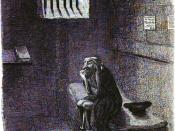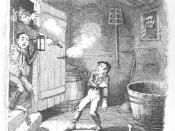Bonan Yuan
Vernita Burrell
English 2000
Sep 29, 2014
Women in the Victorian Era
Oliver Twist by Charles Dickens was written in the Victorian era when women were supposed to be at home and perform domestic works. People back to that time admired women who were pure which means sexually inactive and capable of sacrifice especially for their husbands. Rose Maylie and Nancy, two characters portrayed by Dickens, are both originally orphans but from two completely different social classes. From both Rose and Nancy, we can see the strength of women demonstrated by Dickens that men are lack of.
Rose is an orphan like Oliver Twist. She described as an innocent and perfect young girl. In Rose's first appearance of the novel, Dickens portrays Rose as an angel, "the young lady was in the lovely bloom and spring-time of womenhood: at that age, when, if ever angels be for God's good purposes enthroned in mortal forms, they may be, without impiety, supposed to aside in such as hers."(Chapter 29, page 177) Dickens also portrays her as "So mild and gentle; so pure and beautiful".
Rose is a symbol of women that everyone admired in the Victorian Era. On the other hand, the initial portrait of Nancy gives people an impression of a woman who was born in low class and lack of manner. Dickens depicts Nancy and Bet as "they wore a good deal of hair, not very neatly turned up behind, and were a rather untidy about the shoes and stocks, they were not exactly pretty, perhaps; but they had a great deal of colour in their faces, and looked quite stout and hearty. Being remarkably free and agreeable in their manners, Oliver thought them very nice girls indeed. As there is no doubt they were." (Chapter 9, Page53) The two words used here "stout and hearty" shows that Nancy may not be beautiful and gentle but strong and practical. For Rose, Dickens uses every possible word to describe her beauty and elegance. In contrast, Dickens depicts Nancy as a mundane woman with heavy makeup and low manners. However, despite her behaviors and outlook, she is also introduced as a nice girl. Therefore, from the first introduction of the two characters, Nancy and Rose are both introduced as the positive roles but they are introduced in different ways.
Social class is a quite important factor in forming a person's characteristic. Nancy belongs to the working class which was the lowest class in society. She is only 16 years old but behaves much older than she really is. She works as prostitute but she is also Sike's mistress and a member of Fagin's gang. Nancy does not has a last name in the novel which means that she has no family and no identity. Comparing to Nancy, Rose was also an orphan but she was adopted by Mrs. Maylie when she was a young girl that gives Rose a name which is also a family and an identity. From the conversation between Rose and Nancy, Dickens tries to highlight the social difference between Rose and Nancy,
"'Oh, lady, lady!' she said, clasping her hands passionately before her face, 'if there was more like you, there would be fewer like me,-there would-there would!'
'Sit down,' said Rose, earnestly. 'If you are in poverty or affliction I shall be truly glad to relieve you if I can,-I shall indeed. Sit down.'
'Let me stand, lady,' said the girl, still weeping, 'and do not speak to me so kindly till you know me better. It is growing late. Is-is-that door shut?'"(Chapter 40, Page 252)
In the conversation between Nancy and Rose, Nancy knows where she belongs and her social status, which makes her to choose to stand. On the other hand, Rose shows her respects to Nancy, which is consistent with her good manners and gentle behaviors. From this conversation, the social class gap insulates two kind girls and traps them especially for Nancy. Nancy thinks she belongs to the lower class from her roots. Nancy calls Rose "lady", which indicates that she has much respect for her while she disdains herself while she says "and do not speak to me so kindly till you know me better." Nancy classifies herself into the lowest class or in other words the scums of the society. In contrast to Nancy, Rose seizes her reputation with respect to everyone and considers herself as a mannered woman in upper class from both behaviors and words.
The environments that Nancy and Rose were brought up not only result in different behaviors and manners but also in their different perspectives to men and marriage. Nancy belongs to Sikes and she thinks she would not be able to survive without Sikes. Although Sikes mistreats and abuses her, she would not leave him because she has no family and nowhere to go without Sikes. In other words, Nancy considers herself as an affixation of Sikes. When Nancy talks to Mr. Brownlow on London Bridge, Mr. Brownlow begs Nancy to accept their help but Nancy declines their kindness since she thinks she is chained to her life. Also, Nancy begs Mr. Brownlow not to expose Sikes because she does not want lose Sikes. Nancy is trapped even the aid from the outside could get her rid of the life that she is suffering. In contrast, Rose has more choices facing the men and marriage. Rose resists the marriage with Harry because Rose thinks marriage with Harry could damage her reputation. Rose could be able to decline the proposal from Harry because she has a family that means she would not be homeless like Nancy if she declines to marry Harry. In the novel, Rose is described as pure and sexually inactive, which means she does not have lust, one of the seven sins that was considered as a bad thing in the Victorian era.
In contrast to women in Oliver Twist, men are presented as the weaker sex. It is Nancy who finally saves Oliver Twist's life but sacrifices her own life. In the novel, Dickens successfully demonstrates the seven sins in men. Mr. Bumble enjoys his own feast while letting the boys in workhouse starve, which demonstrates his gluttony. He marries Mrs. Corney just for her nice house and furniture, which demonstrates his greed. Fagin chooses to train a gang for his personal wealth by stealing but not to work in the right ways, which demonstrates his greed and sloth. Sikes beats Nancy to death for her exposure of the gang to police, which demonstrates his wrath. The gang boys in Fagin's places stripe Oliver's fancy clothes from Mr. Brownlow, which shows their envy. Monks, the brother of Oliver wants to turn Oliver into a criminal in order to take all the shares of inheritance even Oliver is his biological brother. They all live in specific classes and desire for their own goods. They obey to the upper classes and authorities while ignore the truth and kindness. They are terrified by the ones who have more power or strength but bully those who have less power or strength.
The women portrayed in Oliver Twist come from different social standings. The roles in the novel seem unimportant. However, their insignificant existences do not affect them become the saviors of Oliver Twist and enact justice and truth in this corrupted society. They all have moral strength while other men who are physically stronger are lack of. Nancy, a fallen women, salves herself from evilness to goodness by exposing Fagin's gang to Mr. Brownlow and at the same time sacrificing her life in order to save Oliver's life. Rose, the angel, also generally sacrifice herself for Oliver's life. Agnes, Oliver's mother, although never really appears in the novel, died alone in the workhouse after giving birth to Oliver and sacrificed herself for just her family's reputation. Those women are mentally strong and brave. They are not terrified by death or the stronger like other men in the novel. They undertake so many deadly miseries but take nothing as reward. Their existence could be easily forgotten by people afterwards. Their destinies are carelessly controlled by men and every change made by them takes death as cost. In Oliver Twist, Dickens portrays women as the actual strong ones from Oliver's birth to Oliver's relief of his miserable life. Dickens turns those ordinary characters in life into a group of brave women who actually save Oliver's life.


